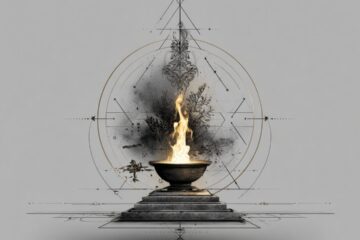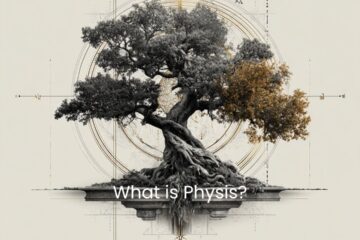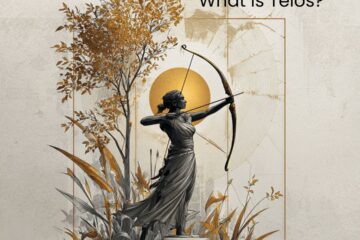What is Daimon?

Daimon, or daemon, is the inner spirit and guardian that connects universal reason (Logos) with the individual self, guiding each person toward virtue and alignment with nature. In Stoic philosophy, it is not mystical or external, but the rational core within you that reasons and acts virtuously.
Although the term daimon (δαίμων) might sound esoteric or even ominous to modern ears, it has a rich and noble meaning in Stoicism. Your daimon is your highest self, the steady, inner companion that points you toward what is just, wise, and truly good.
Breaking Down the Word
Greek: δαίμων (daimōn)
Alternate spelling: daemon
Etymology: The term likely stems from the ancient root “da-”, meaning “to divide” or “to allot.” Related words like δαιτρός (distributor) and δαίς (a feast or portion) reflect the idea of an assigned share or destiny.
Originally, a daimon was a divine or semi-divine being that dispensed one’s fate. But in Stoicism, it evolved into something internal, a rational essence, a personal guardian placed within you by nature itself, reflecting your unique role in the universe.
Key Dimensions of Daimon in Stoicism
- Inner Rational Nature
Your daimon is the part of you most aligned with logos. It’s your moral compass, speaking not through emotion, but through reason. - Personal Guardian
Epictetus calls the daimon your assigned director and guardian, always alert, incorruptible, and tasked with your care. - Connection to the Cosmos
Your daimon is not separate from the universe. It connects your individuality to the structure and order of nature as a whole. - Voice of Conscience
Not a feeling or instinct, but the clear, reasoned voice within, always asking, “What is right in this moment?”
How Daimon Reflects Core Stoic Principles
- Virtue (ἀρετή)
The daimon consistently calls you toward virtue, the only true good in Stoicism. It reminds you of your highest potential. - Reason (λόγος)
As a personal spark of logos, your daimon is your bridge to universal reason. It helps you make judgments based on clarity, not impulse. - Nature (φύσις)
Following your daimon means living in accordance with your true nature, rational, social, and ordered. - Eudaimonia (εὐδαιμονία)
The word eudaimonia literally means “being in a good spirit state.” It is the flourishing life, lived in harmony with your rational guide, not through pleasure, but through virtue.
Modern Misunderstandings
Daimon ≠ Demon
Though they share a linguistic root, “daemon” in ancient Greek philosophy is not evil. It refers to a divine, internal presence that helps guide you toward wisdom and wholeness.
Daimon ≠ Instinct or Gut Feeling
Your spirit is not a hunch or reactive emotion. It’s the disciplined, reasoned part of you that speaks quietly but in every moment.
Why Daimon Is Central to Stoic Practice
To live like a Stoic is to live in accordance with your daimon. It is your ever-present director, entrusted to you by nature itself. Epictetus explains:
“He [Zeus] has assigned to each man a director, his own personal daemon, and committed him to his guardianship; a director whose vigilance no slumbers interrupt, and whom no false reasoning can deceive.”
Epictetus Discourses, Book 1, Chapter 14.12
This daimon is the clearest guide you will ever have. It is incorruptible, tireless, and never misled by appearances. The Stoic path is not about seeking something outside yourself; it is about listening to this inner voice.
Practical Ways to Cultivate Your Daimon
- Morning Intention
Begin the day with: What would my daimon, my rational guide, direct me to do today? - Evening Review
Journal your actions: Did I follow reason or impulse? Did I act as a guardian of my own mind? - Micro-Pauses in Action
When tempted to react, ask: Is this aligned with my daimon, or just my ego? - Live in Its Presence
Imagine your daimon walking beside you, not as a judge, but as your truest self, watching your choices.
❓ FAQ
What does daimon mean in Stoicism?
In Stoicism, daimon (or daemon) refers to your inner rational spirit and guardian, assigned by nature to help guide your actions in alignment with virtue and reason.
Is daimon the same as a soul?
Not exactly. Your daimon is the highest, rational aspect of the soul — the part most aligned with nature and universal reason.
Can anyone live in harmony with their daimon?
Yes. The Stoics believed every human has a daimon, and that through daily reflection and rational practice, anyone can live in step with it.
Conclusion
Your daimon is your clearest companion, always alert, always present, always guiding. When you ignore it, you feel the dissonance. When you follow it, you experience integrity and peace. Practicing Stoicism means learning to live with and listen to this inner guardian.
Want to explore more Stoic strategies? Book a free consultation with one of our Stoic Coaches or learn about more Stoic philosophy terms. You can also listen to the Via Stoica podcast on Spotify or Apple Podcasts or watch it on YouTube.



0 Comments